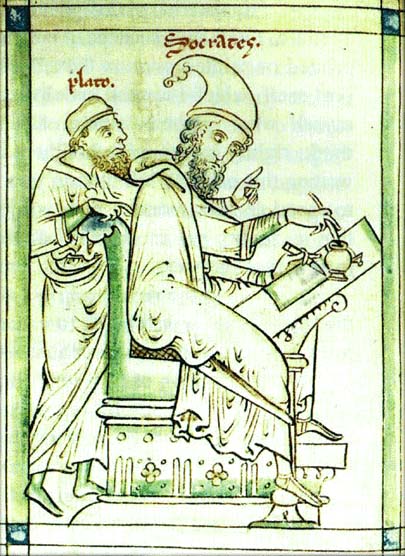 Below is some stuff straight out of Wikipedia, on Plato's use of Socrates. Again: if you're looking for more complex, in depth, or rigorous sources, I suggest you take a look at the citations, references, and external links at the end of the Wikipedia article on Plato. There's an extensive list of sources that dig into the questions or problems we talked about in class today.
Below is some stuff straight out of Wikipedia, on Plato's use of Socrates. Again: if you're looking for more complex, in depth, or rigorous sources, I suggest you take a look at the citations, references, and external links at the end of the Wikipedia article on Plato. There's an extensive list of sources that dig into the questions or problems we talked about in class today.Even easier than the Internet, though, is the bibliography on page xxxvii of the edition of Gorgias that we're using in class. You don't even have to have an iPhone or Blackberry to have access to that bibliography, at any time. Just keep the book in your bag, and you're totally technological.
All of the following is from the section titled "Unity and Diversity of the Dialogues":
If Plato's important dialogues do not refer to Socrates' execution explicitly, they allude to it, or use characters or themes that play a part in it. Five dialogues foreshadow the trial: In the Theaetetus (210d) and the Euthyphro (2a–b) Socrates tells people that he is about to face corruption charges. In the Meno (94e–95a), one of the men who brings legal charges against Socrates, Anytus, warns him about the trouble he may get into if he does not stop criticizing important people. In the Gorgias, Socrates says that his trial will be like a doctor prosecuted by a cook who asks a jury of children to choose between the doctor's bitter medicine and the cook's tasty treats (521e–522a). In the Republic (7.517e), Socrates explains why an enlightened man (presumably himself) will stumble in a courtroom situation. The Apology is Socrates' defense speech, and the Crito and Phaedo take place in prison after the conviction. In the Protagoras, Socrates is a guest at the home of Callias, son of Hipponicus, a man whom Socrates disparages in the Apology as having wasted a great amount of money on sophists' fees.
Two other important dialogues, the Symposium and the Phaedrus, are linked to the main storyline by characters. In the Apology (19b, c), Socrates says Aristophanes slandered him in a comic play, and blames him for causing his bad reputation, and ultimately, his death. In the Symposium, the two of them are drinking together with other friends. The character Phaedrus is linked to the main story line by character (Phaedrus is also a participant in the Symposium and the Protagoras) and by theme (the philosopher as divine emissary, etc.) The Protagoras is also strongly linked to the Symposium by characters: all of the formal speakers at the Symposium (with the exception of Aristophanes) are present at the home of Callias in that dialogue. Charmides and his guardian Critias are present for the discussion in the Protagoras. Examples of characters crossing between dialogues can be further multiplied. The Protagoras contains the largest gathering of Socratic associates.
No comments:
Post a Comment